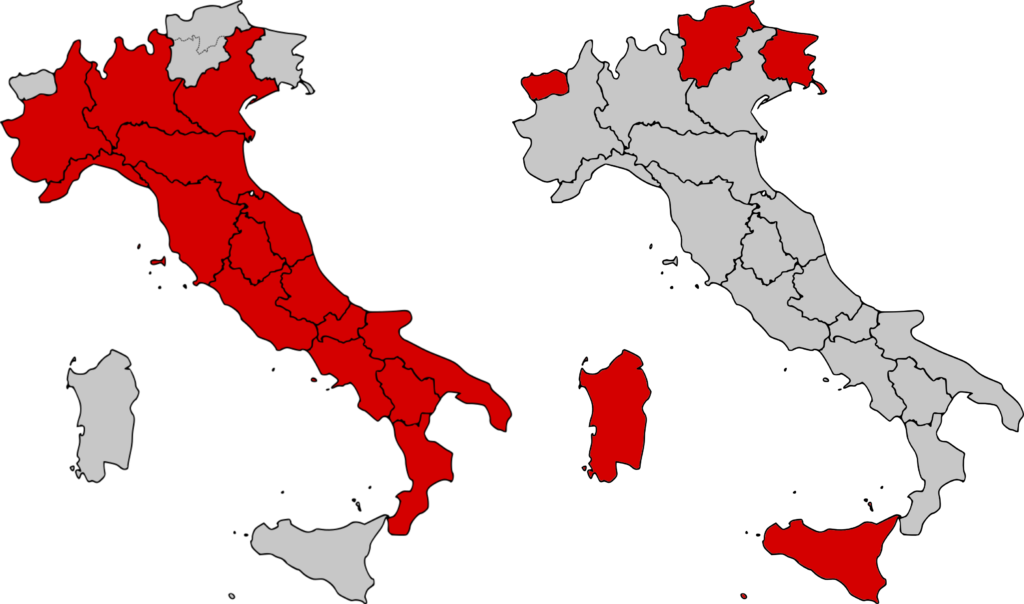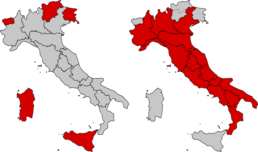Italy, the legitimate implementation of differentiated autonomy
A rigorous, multi-level process will allow Emilia-Romagna, Lombardy and Veneto to reach parliamentary approval of their special requests
The recognition of forms of “differentiated autonomy” pursuant to Article 116, third paragraph, of the Constitution of the Italian Republic has imposed itself at the center of the institutional debate on the relationship between the central State and the Regions following the initiatives taken by Lombardy, Veneto and Emilia-Romagna, which were recorded in the final part of the XVII parliamentary legislature.
On February 28, 2018, the Government in office at the time signed three separate preliminary agreements with the Regions concerned, which identified the general principles, the methodology and a (first) list of subjects with a view to the overall definition of the agreement.
Possibility of various adjustments on a ten-year basis
The aforementioned three Preliminary Agreements of February 28, 2018 provide (in Article 2 of the General Provisions) that the understanding is to last for ten years, although it may be amended at any time by mutual agreement between the State and the Region, “if, during the ten-year period, factual or legal situations arise that justify its revision.”
The Preliminary Agreements also provide that the agreement has a duration of ten years, however, it can be modified at any time by mutual agreement between the State and the Region concerned, “if during the ten-year period, factual or legal situations arise that justify its revision”.
Thus Bologna has privileged the legislative route
The ways in which the three Regions have activated the path under article 116, third paragraph, are different. It is worth recalling that the Regions of Lombardy and Veneto held on October 22, 2017, with positive results, two consultative referendums on the attribution of additional special forms and conditions of autonomy.
Italy, because differentiated autonomy “is” the Constitution
Emilia-Romagna, on the other hand, took action, at the instigation of the President of the Region, with the approval by the Legislative Assembly, on October 3, 2017, of a resolution to initiate the procedure aimed at the signing of the agreement with the Government required by the dictates of the Constitutional Charter.
In all three Preliminary Agreements, the matters of priority regional interest subject to negotiation in the first phase of negotiations are as follows: Protection of the environment and the ecosystem; Protection of health; Education; Protection of labor; International relations and with the European Union. All three northern Italian Regions that have taken action have reserved the possibility of extending the negotiations – at a later date – to other matters.
The Lombardy region aims at the whole of Government
The preliminary agreement with Lombardy, unlike those with Emilia-Romagna and Veneto, makes express mention – as the subject of a possible subsequent agreement – of matters of interest to local autonomies, such as: coordination of public finance and the tax system; government of the territory.
The Annexes (which are an integral and substantial part of the Preliminary Agreements) concern the matters in relation to which the Regions are granted additional forms and special conditions of administrative and legislative autonomy.
However, the possibility remains open for the negotiation to extend to further aspects of the subjects indicated and to other different subjects (article 6). Each annex concerns a subject to which an Addendum on international relations and with the European Union is added.

Towards an extension of the range of subjects
With the beginning of the eighteenth legislature, all three regions with which the so-called pre-understandings were stipulated have expressed to the Government their intention to “broaden the range of subjects to be transferred” (Chamber of Deputies, Question for immediate answer number 3-00065 of July 11, 2018).
Negotiations between the three Regions and the Ministries involved “ratione materiae” have thus resumed as part of the coordination activity in charge of the Minister for Regional Affairs.
From Piedmont to Campania, six new requests
The Government’s preliminary investigation of the applications relating to competences involved the request to the Regions concerned for detailed documentation. On the basis of the documentation provided, technical meetings were held at the headquarters of the Department for Regional Affairs in which the regional structures responsible for individual matters met with the technicians of the Ministry to which the competence in question belongs. Regarding the economic-financial aspect, of great constitutional importance, meetings were held with the Ministry of Economy and Finance.
In the meantime, other local public bodies, although not having signed any pre-agreement with the Government, have expressed their willingness to embark on a path to obtain further forms of autonomy similar to that of Emilia-Romagna, Lombardy and Veneto (the Government has officially received requests from Piedmont, Liguria, Tuscany, Umbria, Marche and Campania).
Draft Executive-Territorial agreements published
In the meeting of the Council of Ministers number 33 of December 21, 2018, it was also shared the information carried out by the Minister pro tempore for Regional Affairs and Autonomies on the path of implementation of differentiated autonomy requested punctually by the Regions Emilia-Romagna, Veneto and Lombardy.
In the subsequent meeting of the Council of Ministers number 44 of February 14, 2019, the Minister for Regional Affairs “illustrated the contents of the agreements. The Council of Ministers took note of them and shared their spirit”. The texts of the draft understandings were published on the website of the Regional Affairs Department of the Presidency of the Council, in a text agreed between the Government and each of the three Regions, limited to the “general part”.
In the 2019 DEF emerges the commitment of Palazzo Chigi
In the Update Note to the 2019 DEF, the commitment of Palazzo Chigi to continue the process of implementing differentiated federalism, as gradually structured, is reported. The policies set out in the aforementioned document establish that the process of differentiated autonomy will be carried out: i) in compliance with the “principle of national cohesion and solidarity”; ii) within a framework of defining essential levels of services concerning civil and social rights (LEP or Essential Levels of Performance). All this also with the explicit aim of avoiding “aggravating the gap between the North and the South of the country”.
Two parliamentary commissions at work
During the hearing on the programmatic lines of October 17, 2019 at the Commissions I and V of the Chamber of Deputies, the Minister for Regional Affairs highlighted the Government’s intention to restart from the work done so far. At the same time, he announced the presentation in Parliament of a legislative initiative aimed at defining a unitary regulatory framework in which interventions to implement Article 116, third paragraph, of the Constitution can be defined, taking into account the constitutional provisions and the model of equalization of the Regions with ordinary statute defined by Law May 5, 2009, number 42, and Legislative Decree May 6, 2011, number 68.
Preliminary agreement between the Government and the Emilia-Romagna Region (in Italian)
Preliminary agreement between the Government and the Lombardy Region (in Italian)
Preliminary agreement between the Government and the Veneto Region (in Italian)
The Draft Law that the Government decided to submit to Parliament was included among the measures linked to the budget decision in the Update Note to the DEF (Economic and Financial Document, originally the Economic and Financial Planning Document or DPEF) for the year 2019.
In order to examine issues connected with the implementation of “differentiated regionalism”, a survey was launched by the Parliamentary Commission for Regional Issues and, with particular reference to aspects of financial autonomy, the Parliamentary Commission for the Implementation of Fiscal Federalism is carrying out a series of hearings.







